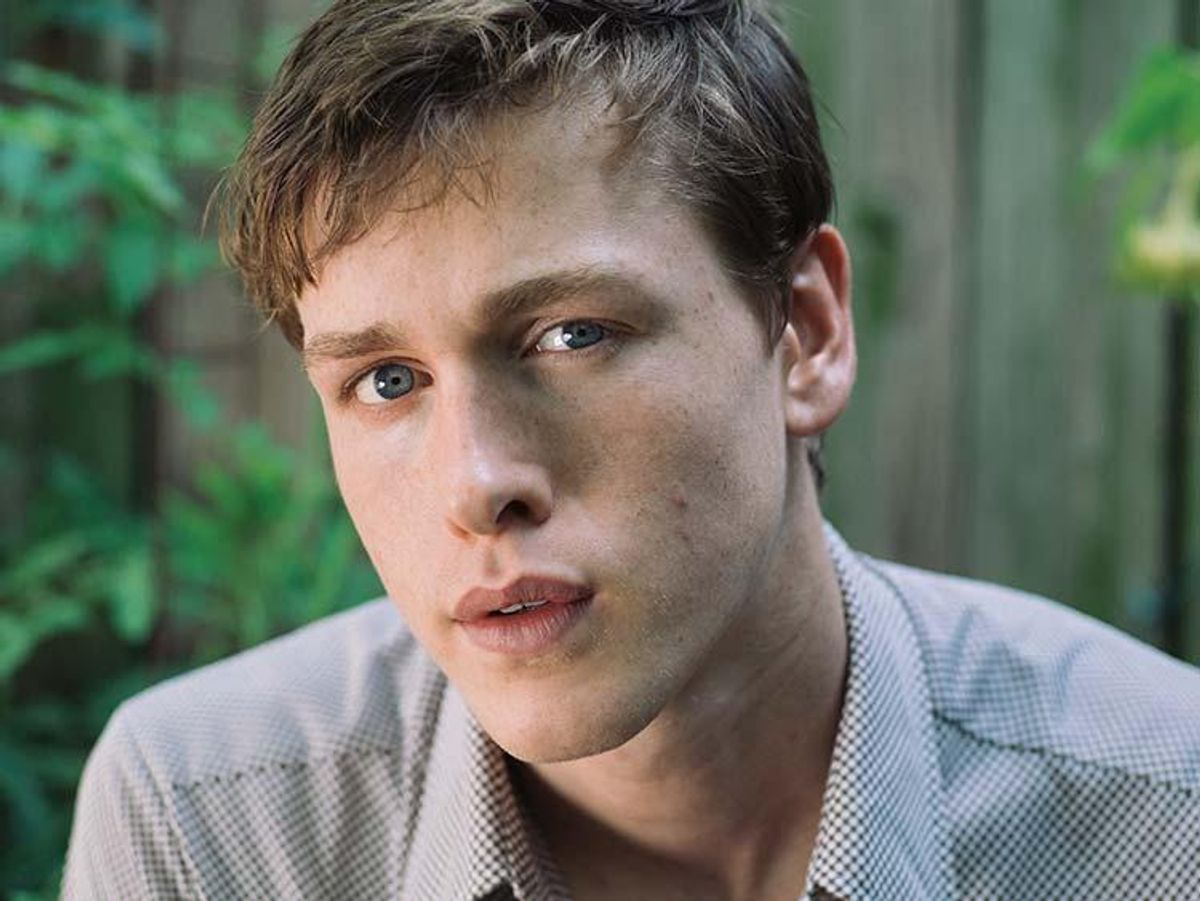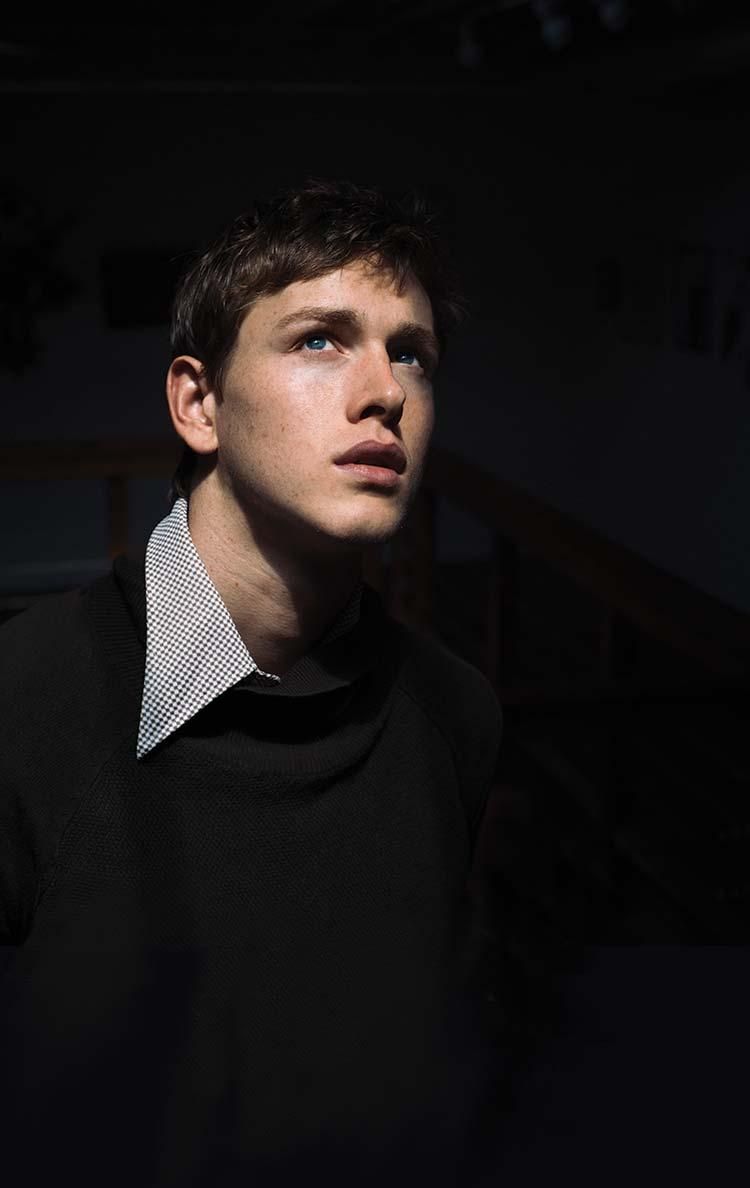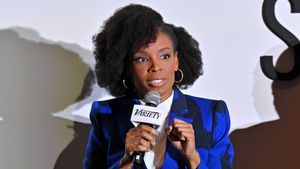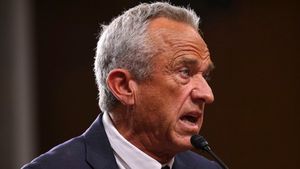Fireworks fill the Coney Island sky in an early scene in Beach Rats, the modest and daringly somber new movie from Brooklyn-raised filmmaker Eliza Hittman. Sitting near teenage Frankie (Harris Dickinson) and his trio of ride-or-die cronies, the smitten Simone (Madeline Weinstein) calls the view "romantic." But for Frankie, it's a symbol of his monotonous prison of a life. "They're the same fireworks every week," he replies. "It's the opposite of romantic."
Bobbing his lanky frame through the streets, with his shoulders hunched, Frankie presents the same fuck-it swagger as his friends (all played by young locals). But Dickinson, a Londoner who'd been to New York only once before shooting began, was intent on accessing everything that weighs those shoulders down. While sitting in on castings and observing his on-screen peers' behavior, the 20-year-old strived to unpack Frankie's sexual confusion, which the character buries so deep, it eats him from within.
"That's the saddest part," Dickinson says. "Because what comes with that suppression is anger. There's a toxicity inside Frankie, and all these forms of self-medication he goes through to be numb." That includes drinking, stealing his dying father's pain killers, using Simone as a beard, and frequenting a shady vape shop to exhale artful rings of pot smoke. But even though Frankie's private extracurriculars--and suffering--center on his online chats and in-person trysts with older men, Dickinson is hesitant to call him a closet case. "I don't even like to say he's struggling with his sexuality," the actor says, "because I don't think he's coming to terms with it or accepting it at all. It's so ambiguous."
Dickinson is now comely and chiseled, with freckles dotting his doe-eyed face, but he says he was once "an artistic, thick, fat kid." He wasn't bullied, however, nor did he struggle much with figuring out who he was. His identification with Frankie comes from grasping basic adolescent loneliness, and from knowing that one's native environment can have drastic effects on who they ultimately become. Making Beach Rats taught him "a lot about the relationship between sexual identity and class," he says. "Sometimes you're born into narrow-minded communities with specific expectations, which can hugely affect your personal journey and expressions of sexuality." Dickinson was born in Leytonstone, London, and grew up outside east London in Highams Park. It's a traditional area, he says, but his upbringing was "very liberal." Frankie, though, is stifled by the bigoted pressures of his Kings County stomping grounds.

This further emboldened Dickinson to get inside the character's skin--and to show it. Lifting and grooming himself into a desirable twink, Frankie starts to rack up a lot of dates with daddy types (mainly to ensure that his sexual escapades remain outside his social circle), and we see nearly all of Dickinson, whether in motel rooms or roadside hideouts. "It was a new experience," he says, as was making Beach Rats, his breakout film after drama school and some stage work back home. "But I was comfortable doing it. I'm comfortable in my sexuality and in my body now. You have to come to terms with the fact that you're going to bare yourself on-screen and it's going to exist there forever, but I cared enough about the character that I just wanted to throw myself into it."
As he has with his other projects. In January, he'll play the real-life kidnapped oil heir John Paul Getty III in Trust, Danny Boyle's FX anthology series about the famed Getty dynasty. And later next year, he'll appear opposite Mandy Moore and Amandla Stenberg in The Darkest Minds, a dystopian film about super-powered children who are placed in internment camps. "What excited me most [about The Darkest Minds]," Dickinson says, "was the idea of rebelling against a higher power and fighting for what you believe in amid the madness of a newly corrupt and troubled world."
X-Men-style sci-fi may seem like a far cry from quick highs and queer hookups along Brooklyn's shores, but there's a consistency in Dickinson's penchants and priorities.
"Given that for certain groups it's a terrible time politically, I think it's that much more important that Beach Rats was made," he says. "And it doesn't glorify the coming-out process--it actually presents it from a negative perspective. But I hope those watching it can find a sense of freedom in themselves. No good ever comes of suppressing your true feelings, no matter who's around you, or where you're from."
Photography by Raymond McCrea Jones (in the Historic Old Fourth Ward of Atlanta)





















































































